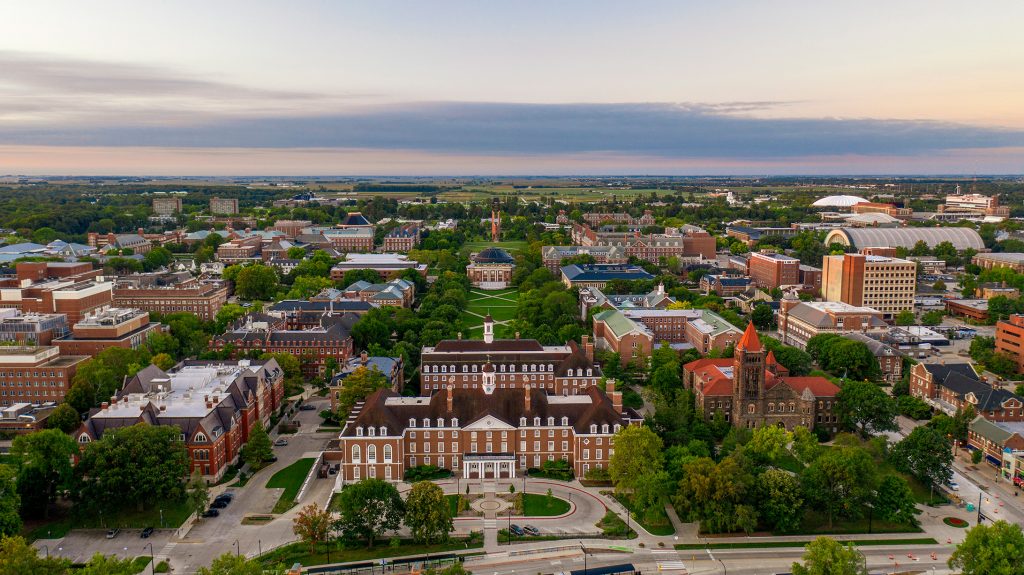CONFERENCE OVERVIEW
The Center for Digital Agriculture hosting our annual conference on March 8, 2023, at the National Center for Supercomputing Applications at the University of Illinois at Urbana-Champaign. The theme of this year’s conference was: How Can Digital Agriculture Help Moderate the Impacts of Climate Change? The conference will bring together an interdisciplinary group of researchers from the areas of automation, data, animals, crops, and people in agriculture. The event will allow local and national Ag Tech leaders, researchers, and government officials to address this critical question.
AGENDA
| Time | Agenda |
|---|---|
| 8:00 – 8:30 am | Breakfast – NCSA Atrium |
| 8:30 – 8:50 am | Welcome and CDA Overview Recording CDA Co-directors, Dr. Matt Hudson and Dr. Vikram Adve |
| 8:50 – 9:00 am | Masters in Engineering in Digital Agriculture Overview Recording
Dr. Christina Tucker, Director of Education, CDA |
| 9:00 – 9:30 am | Climate Change Mitigation: A Really Wicked Problem CDA is Ideally Positioned to Address Recording Dr. Kelvin Droegemeier, Regent Professor of Meteorology, University of Oklahoma |
| 9:30 – 9:45 am | Mechanisms for Incentivizing Cover Crop Adoption and Implications for Soil Carbon Sequestration Recording
Dr. Madhu Khanna, Director of iSEE; Professor, ACES Distinguished Professor in Environmental Economics |
| 9:45 – 10:00 am | Mitigating and Adapting Climate Change in the US Midwest: A Critical Role of Tile Drainage
Dr. Kaiyu Guan, Blue Waters Associate Professor, NRES, & Founding Director, Agroecosystem Sustainability Center |
| 10:00 – 10:30 am | Using Satellites to Advance Climate-smart Agriculture Dr. David Lobell, Gloria and Richard Kushel Director of the Center on Food Security and the Environment Recording Professor, Earth System Science, Stanford University |
| 10:30 – 10:50 am | Break – NCSA Atrium |
| 10:50 – 11:10 am | Is GeoAI the Crystal Ball to Understanding the Plant World and Moderating the Impacts of Climate Change? Recording
Dr. Vasit Sagan, Interim Director, Taylor Geospatial Institute and St. Louis University |
| 11:10 am – 12:10 pm | How Can Digital Agriculture Help Moderate the Impacts of Climate Change? Recording
Panel part 1 Panelists: Dr. Kelvin Droegemeier, University of Oklahoma; Dr. Brenda Wilson, UIUC; Moderator Dr. Bruno Basso, Michigan State University |
| 12:10 – 1:10 pm | Lunch – NCSA Atrium |
| 1:10 – 1:30 pm | Dr. Daniel Jacobson, Computational System Biologist, ORNL Recording |
| 1:30 – 2:00 pm | Pathways to Carbon Negative crop Production with Digital Agriculture Recording
Dr. Bruno Basso, Foundation Professor, Michigan State University |
| 2:00 – 3:00 pm | CDA Focus Areas. Autonomous Farming, Dr. Girsh Chowdhary Recording
Rural Networking, Dr. Deepak Vasisht Recording Livestock Management, Dr. Angela Green-Miller Recording Food System Security, Dr. Yangfeng Ouyang Recording |
| 3:00 – 3:20 pm | Break – NCSA Atrium |
| 3:20 – 3:40 pm | Unlocking Precision Farming through 5G-enabled Digital Twins Robert Belson, Developer Advocate, AWS Edge Computing, Amazon Web Services Zhenjun Zhu, Lead – 5G Customer Innovation Hub, Verizon |
| 3:40 – 4:00 pm | Can Digital Agriculture Save the Planet and Create a New Category of Business? Dr. Chris Harbourt, Chief Strategy Officer, IndigoAg |
| 4:00 – 5:00 pm | How Can Digital Agriculture Help Moderate the Impacts of Climate Change? Recording
Panel part 2 Panelists: Dr. Chris Harbourt, IndigoAg; Dr. Cristina Dalle Ore, Bayer; Moderator: Dr. John Reid, UIUC |
| 5:00 pm | Closing remarks |
| 5:15 – 7:15pm | Networking reception at Barrelhouse34 (34 E Main St, Champaign, IL 61820) |
TRAVEL / LODGING INFO

Champaign-Urbana has many hotels near the University of Illinois campus. A list of nearby hotels can be found here.
Where should I park for the conference?
Metered parking is available near the NCSA building on Clark Street, in the parking garage just north of NCSA, and on other surrounding streets. Rates are $1.00/hour, and all meters accept quarters, dimes, nickels, and dollar coins. While you can park all day in the garage, time limits for surrounding streets are usually two hours. There is no attendant in the parking garage, but you do have the option to pay for metered parking in the parking structure by either using the MobileMeter app on your smart phone, the web at mobilemeter.us, or by phone at 1-217-207-3033. You will need to provide the zone code of 4801 along with the space number indicated on the meter. For more information, go to mobilemeter.us.
